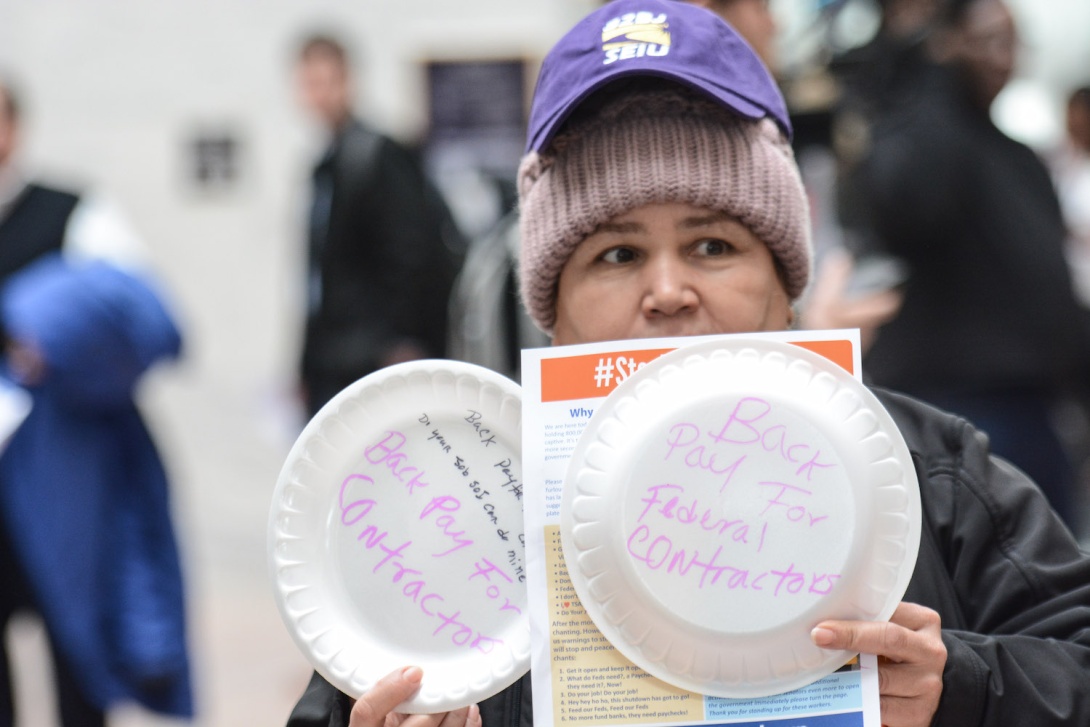Government shutdown is over for now, but pain for contractors is lasting

On Jan. 23, hundreds of members of the American Federation of Government Employees, other union members, federal employees and contractors, and allies held a silent protest against the federal shutdown at the Hart Senate Office Building in Washington, D.C. Among their demands was back pay for federal contractors, who currently are not eligible for it under law. (Photo by AFGE via Flickr.)
The longest government shutdown in U.S. history is over after President Trump signed a bill on Jan. 25 that funds the government through Feb. 15 — although Trump has made it clear that he is willing to force another shutdown if a deal is not struck soon to fund a wall along the U.S. border with Mexico.
Over 800,000 federal employees across the country will now receive back pay for the 35 days that they were furloughed or working without pay. The shutdown forced many of them to sell their belongings, dip into their savings, collect unemployment, or eat at local food banks to survive. For now, at least, their lives can return to normal.
But the same is not true for many of the estimated 4 million federal contract workers nationwide, as these workers are not currently legally entitled to back pay. Many of them hold low-wage positions such as janitors, cafeteria servers, and security guards. Because a disproportionate number of Black businesses rely on federal contracts, many of these contractors are already a part of a racial group that is among the most underpaid, in a country where 40 percent of the population doesn't have enough in savings to cover a $400 emergency expense.
Many federal contract workers live in Southern states, as illustrated by a map recently published by the Washington Post showing the estimated weekly value of contracts with federal agencies by county. Not surprisingly, the area of Virginia outside of Washington, D.C., has a significant concentration of valuable federal contracts. But there are also concentrations of major federal contracts in other Southern states, including Alabama, Florida, Georgia, Louisiana, Mississippi, North Carolina, and Tennessee.
There's currently an effort underway to make federal contractors eligible for back pay in a shutdown. Among those leading the fight is Eleanor Holmes Norton, a Democrat and non-voting delegate who represents Washington, D.C, in the U.S. House.
On Jan. 8, she introduced the Low-Wage Federal Contractor Employee Back Pay Act of 2019, which would guarantee back pay to low-wage federally contracted retail, food, custodial, and security service workers. The bill has over a dozen co-sponsors, including Reps. Don Beyer and Jennifer Wexton of Virginia. Holmes introduced such legislation during prior government shutdowns and when shutdowns were threatened.
A similar bill titled Fair Compensation for Low-Wage Contractor Employees Act was introduced in the Senate on Jan. 16 by a group of Democrats including Tim Kaine and Mark Warner of Virginia. The legislation would provide back pay of up to $600 per paycheck for federal contract employees and ensure that federal contractors are reimbursed for providing shutdown-affected employees with back pay. It has not received any Republican support to date.
"So many of these workers live paycheck-to-paycheck and this painful shutdown has meant that many of them can't afford to pay their bills," Kaine said. "This legislation is an effort to ensure that these contractors who have been denied pay during a shutdown they had no role in causing receive the pay they deserve."
Tags
Rebekah Barber
Rebekah is a research associate at the Institute for Southern Studies and writer for Facing South.
